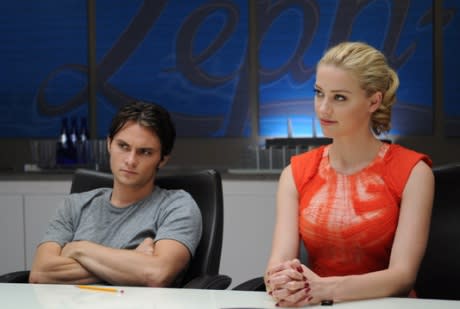Taking its source Max Barry novel of the same name a little too literally, Syrup opens with a spirited voiceover from Scat (Shiloh Fernandez), an assumed image-projection of a name, about the nature of business — marketing, in particular. Doling out a litany of standard observations — ones that Barry would have racked up while working in marketing for Hewlett-Packard — he denotes, mainly, that selling oneself is akin to hawking a product: the quality isn't as important as the presentation and sense of identity a consumer, or employer, might get from indulging.
Inevitably, this fairly rote metaphor is thrust upon a relationship between Scat and young business hotshot Six (Amber Heard). He pulls a fire alarm to get some face time with her, pitching a new cola — ostensibly just syrup and carbonated water, as the title suggests — called "Fukk:" a black-label brand for cynical, anti-consumerist undergrad types. Just as the product is being described by demographic appeal, Six's image is deconstructed as the perfect blend of virgin, slut, mother and bitch, leaving men confused (unable to pigeonhole her as any type), forced to take her seriously.
This premise, wherein the superficiality of selling desire and, ideally, the concept of love are assessed through corporate and interpersonal templates, does possess some emotional weight, having inherent implications about our relationship with people and products. But Rappaport, unlike his fantasy girl projection, tips his hand far too early, revealing his secrets and the thematic trajectory and intentions from the get-go.
This leaves Syrup to play out as a formula, rehashing the same demographically conscious consumer appeal that it smugly criticizes. It's less clever than it thinks (products called "Fukk" and "Cokk" taking the world by storm is a little too on-the-nose and puerile), regurgitating well-known facts about the marketing landscape while itself dwelling on the insincerities of relationships forged in a business world where everyone is merely a projection of desired success.
There's a late effort to inject a bit of reality into the text — a consumer outside the lexicon of hipness a cutting edge product limits itself to takes his life — but it plays as merely a slight concession for a work that miscalculates its image. While Heard is perfectly cast as the immaculately dressed and groomed vessel of shrewdly defined desire, Fernandez doesn't fit in at all, lacking the physical appeal to hold up against his co-star and being too snarky and low class to convince as a brilliant businessman.
Along the way, some of the incisive commentary about consumer culture proves amusing, but beyond this, Syrup merely plays out as a waiting game for the inevitable, pre-destined conclusion, which sells the idea of sincerity and moral righteousness to a populous sitting in theatre seats specifically because of commercials and marketing.
(VSC)Inevitably, this fairly rote metaphor is thrust upon a relationship between Scat and young business hotshot Six (Amber Heard). He pulls a fire alarm to get some face time with her, pitching a new cola — ostensibly just syrup and carbonated water, as the title suggests — called "Fukk:" a black-label brand for cynical, anti-consumerist undergrad types. Just as the product is being described by demographic appeal, Six's image is deconstructed as the perfect blend of virgin, slut, mother and bitch, leaving men confused (unable to pigeonhole her as any type), forced to take her seriously.
This premise, wherein the superficiality of selling desire and, ideally, the concept of love are assessed through corporate and interpersonal templates, does possess some emotional weight, having inherent implications about our relationship with people and products. But Rappaport, unlike his fantasy girl projection, tips his hand far too early, revealing his secrets and the thematic trajectory and intentions from the get-go.
This leaves Syrup to play out as a formula, rehashing the same demographically conscious consumer appeal that it smugly criticizes. It's less clever than it thinks (products called "Fukk" and "Cokk" taking the world by storm is a little too on-the-nose and puerile), regurgitating well-known facts about the marketing landscape while itself dwelling on the insincerities of relationships forged in a business world where everyone is merely a projection of desired success.
There's a late effort to inject a bit of reality into the text — a consumer outside the lexicon of hipness a cutting edge product limits itself to takes his life — but it plays as merely a slight concession for a work that miscalculates its image. While Heard is perfectly cast as the immaculately dressed and groomed vessel of shrewdly defined desire, Fernandez doesn't fit in at all, lacking the physical appeal to hold up against his co-star and being too snarky and low class to convince as a brilliant businessman.
Along the way, some of the incisive commentary about consumer culture proves amusing, but beyond this, Syrup merely plays out as a waiting game for the inevitable, pre-destined conclusion, which sells the idea of sincerity and moral righteousness to a populous sitting in theatre seats specifically because of commercials and marketing.
